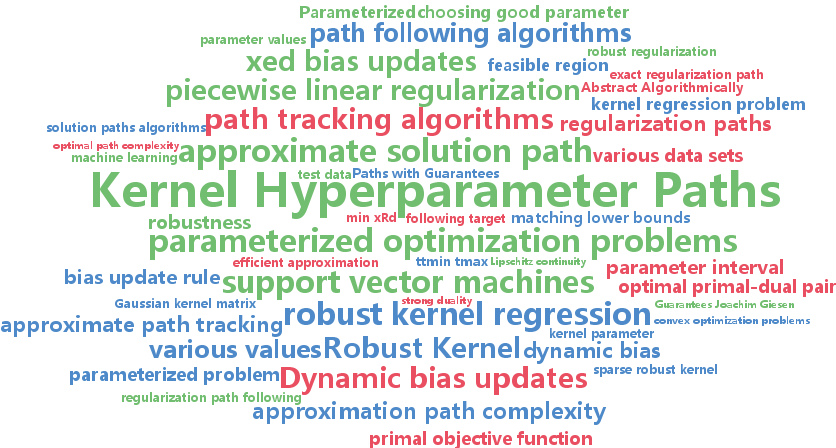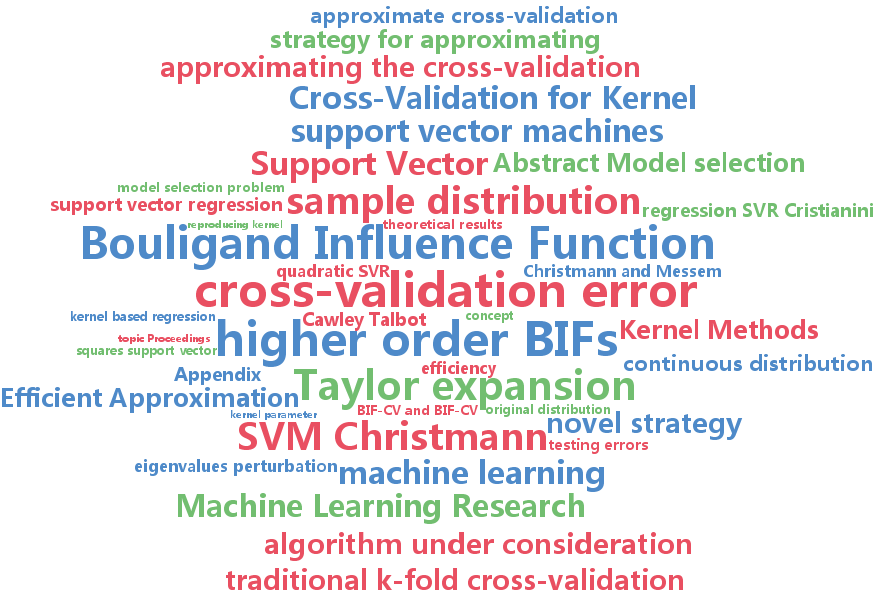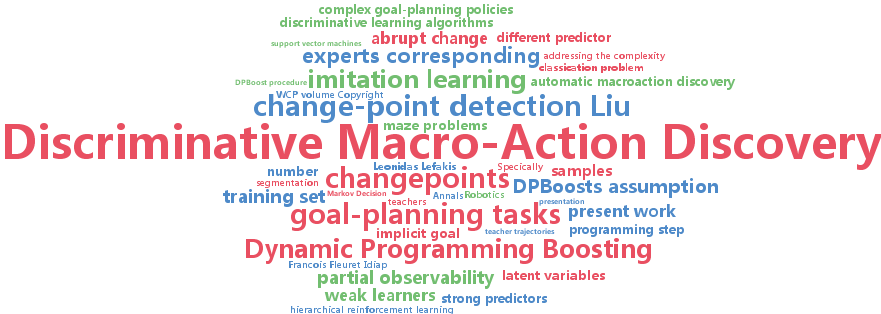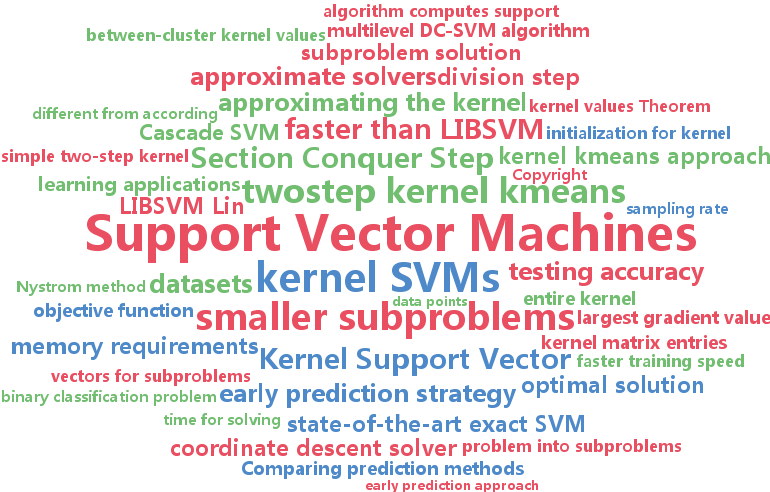support vector machines
-
Ji Liu and Steve Wright and Christopher Re and Victor Bittorf and Srikrishna Sridhar
An Asynchronous Parallel Stochastic Coordinate Descent Algorithm (pdf)
We describe an asynchronous parallel stochastic coordinate descent algorithm for minimizing smooth unconstrained or separably constrained functions. The method achieves a linear convergence rate on functions that satisfy an essential strong convexity property and a sublinear rate ($1/K$) on general convex functions. Near-linear speedup on a multicore system can be expected if the number of processors is $O(n^{1/2
-
Joachim Giesen and Soeren Laue and Patrick Wieschollek
Robust and Efficient Kernel Hyperparameter Paths with Guarantees (pdf)
Algorithmically, many machine learning tasks boil down to solving parameterized optimization problems. Finding good values for the parameters has significant influence on the statistical performance of these methods. Thus supporting the choice of parameter values algorithmically has received quite some attention recently, especially algorithms for computing the whole solution path of parameterized optimization problem. These algorithms can be used, for instance, to track the solution of a regularized learning problem along the regularization parameter path, or for tracking the solution of kernelized problems along a kernel hyperparameter path. Since exact path following algorithms can be numerically unstable, robust and efficient approximate path tracking algorithms became popular for regularized learning problems. By now algorithms with optimal path complexity are known for many regularized learning problems. That is not the case for kernel hyperparameter path tracking algorithms, where the exact path tracking algorithms can also suffer from numerical instabilities. The robust approximation algorithms for regularization path tracking can not be used directly for kernel hyperparameter path tracking problems since the latter fall into a different problem class. Here we address this problem by devising a robust and efficient path tracking algorithm that can also handle kernel hyperparameter paths and has asymptotically optimal complexity. We use this algorithm to compute approximate kernel hyperparamter solution paths for support vector machines and robust kernel regression. Experimental results for this problem applied to various data sets confirms the theoretical complexity analysis.
-
Yong Liu and Shali Jiang and Shizhong Liao
Efficient Approximation of Cross-Validation for Kernel Methods using Bouligand Influence Function (pdf)
Model selection is one of the key issues both in recent research and application of kernel methods. Cross-validation is a commonly employed and widely accepted model selection criterion. However, it requires multiple times of training the algorithm under consideration, which is computationally intensive. In this paper, we present a novel strategy for approximating the cross-validation based on the Bouligand influence function (BIF), which only requires the solution of the algorithm once. The BIF measures the impact of an infinitesimal small amount of contamination of the original distribution. We first establish the link between the concept of BIF and the concept of cross-validation. The BIF is related to the first order term of a Taylor expansion. Then, we calculate the BIF and higher order BIFs, and apply these theoretical results to approximate the cross-validation error in practice. Experimental results demonstrate that our approximate cross-validation criterion is sound and efficient.
-
Jason Weston and Ron Weiss and Hector Yee
Affinity Weighted Embedding (pdf)
Supervised linear embedding models like Wsabie (Weston et al., 2011) and supervised semantic indexing (Bai et al., 2010) have proven successful at ranking, recommendation and annotation tasks. However, despite being scalable to large datasets they do not take full advantage of the extra data due to their linear nature, and we believe they typically underfit. We propose a new class of models which aim to provide improved performance while retaining many of the benefits of the existing class of embedding models. Our approach works by reweighting each component of the embedding of features and labels with a potentially nonlinear affinity function. We describe several variants of the family, and show its usefulness on several datasets.
-
Leonidas Lefakis and Francois Fleuret
Dynamic Programming Boosting for Discriminative Macro-Action Discovery (pdf)
We consider the problem of automatic macro-action discovery in imitation learning, which we cast as one of change-point detection. Unlike prior work in change-point detection, the present work leverages discriminative learning algorithms. Our main contribution is a novel supervised learning algorithm which extends the classical Boosting framework by combining it with dynamic programming. The resulting process alternatively improves the performance of individual strong predictors and the estimated change-points in the training sequence. Empirical evaluation is presented for the proposed method on tasks where change-points arise naturally as part of a classification problem. Finally we show the applicability of the algorithm to macro-action discovery in imitation learning and demonstrate it allows us to solve complex image-based goal-planning problems with thousands of features.
-
Feiping Nie and Yizhen Huang and Heng Huang
Linear Time Solver for Primal SVM (pdf)
Support Vector Machines (SVM) is among the most popular classification techniques in machine learning, hence designing fast primal SVM algorithms for large-scale datasets is a hot topic in recent years. This paper presents a new L2-norm regularized primal SVM solver using Augmented Lagrange Multipliers, with linear-time computational cost for Lp-norm loss functions. The most computationally intensive steps (that determine the algorithmic complexity) of the proposed algorithm is purely and simply matrix-by-vector multiplication, which can be easily parallelized on a multi-core server for parallel computing. We implement and integrate our algorithm into the interfaces and framework of the well-known LibLinear software toolbox. Experiments show that our algorithm is with stable performance and on average faster than the state-of-the-art solvers such as SVMperf , Pegasos and the LibLinear that integrates the TRON, PCD and DCD algorithms.
-
Cho-Jui Hsieh and Si Si and Inderjit Dhillon
A Divide-and-Conquer Solver for Kernel Support Vector Machines (pdf)
The kernel support vector machine (SVM) is one of the most widely used classification methods; however, the amount of computation required becomes the bottleneck when facing millions of samples. In this paper, we propose and analyze a novel divide-and-conquer solver for kernel SVMs (DC-SVM). In the division step, we partition the kernel SVM problem into smaller subproblems by clustering the data, so that each subproblem can be solved independently and efficiently. We show theoretically that the support vectors identified by the subproblem solution are likely to be support vectors of the entire kernel SVM problem, provided that the problem is partitioned appropriately by kernel clustering. In the conquer step, the local solutions from the subproblems are used to initialize a global coordinate descent solver, which converges quickly as suggested by our analysis. By extending this idea, we develop a multilevel Divide-and-Conquer SVM algorithm with adaptive clustering and early prediction strategy, which outperforms state-of-the-art methods in terms of training speed, testing accuracy, and memory usage. As an example, on the covtype dataset with half-a-million samples, DC-SVM is 7 times faster than LIBSVM in obtaining the exact SVM solution (to within 10^{-6
-
Xiaotong Yuan and Ping Li and Tong Zhang
Gradient Hard Thresholding Pursuit for Sparsity-Constrained Optimization (pdf)
Hard Thresholding Pursuit (HTP) is an iterative greedy selection procedure for finding sparse solutions of underdetermined linear systems. This method has been shown to have strong theoretical guarantees and impressive numerical performance. In this paper, we generalize HTP from compressed sensing to a generic problem setup of sparsity-constrained convex optimization. The proposed algorithm iterates between a standard gradient descent step and a hard truncation step with or without debiasing. We prove that our method enjoys the strong guarantees analogous to HTP in terms of rate of convergence and parameter estimation accuracy. Numerical evidences show that our method is superior to the state-of-the-art greedy selection methods when applied to learning tasks of sparse logistic regression and sparse support vector machines.
-
Yujia Li and Rich Zemel
High Order Regularization for Semi-Supervised Learning of Structured Output Problems (pdf)
Semi-supervised learning, which uses unlabeled data to help learn a discriminative model, is especially important for structured output problems, as considerably more effort is needed to label its multidimensional outputs versus standard single output problems. We propose a new max-margin framework for semi-supervised structured output learning, that allows the use of powerful discrete optimization algorithms and high order regularizers defined directly on model predictions for the unlabeled examples. We show that our framework is closely related to Posterior Regularization, and the two frameworks optimize special cases of the same objective. The new framework is instantiated on two image segmentation tasks, using both a graph regularizer and a cardinality regularizer. Experiments also demonstrate that this framework can utilize unlabeled data from a different source than the labeled data to significantly improve performance while saving labeling effort.
-
Mohamad Ali Torkamani and Daniel Lowd
On Robustness and Regularization of Structural Support Vector Machines (pdf)
Previous analysis of binary SVMs has demonstrated a deep connection between robustness to perturbations over uncertainty sets and regularization of the weights. In this paper, we explore the problem of learning robust models for structured prediction problems. We first formulate the problem of learning robust structural SVMs when there are perturbations in the feature space. We consider two different classes of uncertainty sets for the perturbations: ellipsoidal uncertainty sets and polyhedral uncertainty sets. In both cases, we show that the robust optimization problem is equivalent to the non-robust formulation with an additional regularizer. For the ellipsoidal uncertainty set, the additional regularizer is based on the dual norm of the norm that constrains the ellipsoidal uncertainty. For the polyhedral uncertainty set, we show that the robust optimization problem is equivalent to adding a linear regularizer in a transformed weight space related to the linear constraints of the polyhedron. We also show that these constraint sets can be combined and demonstrate a number of interesting special cases. This represents the first theoretical analysis of robust optimization of structural support vector machines. Our experimental results show that our method outperforms the nonrobust structural SVMs on real world data when the test data distributions is drifted from the training data distribution.









